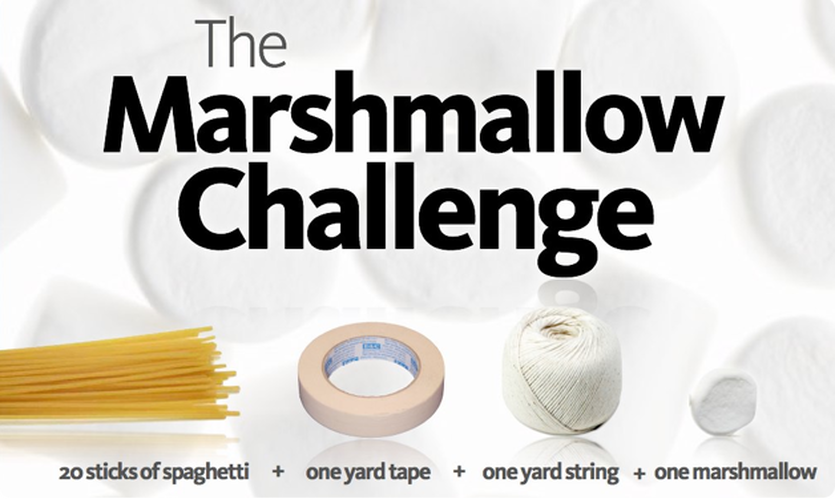The Marshmallow Challenge
 45 min |
Team |
Challenge
Creativity Learn through experience
45 min |
Team |
Challenge
Creativity Learn through experience
What can students learn from this?
This Marshmallow Challenge is a fun challenge to do for people of all ages; from kindergarten kids to elderly people. It will activate your students and makes them competitive. The challenge teaches students that prototyping and iterating can help achieve success. They will learn about the importance of teamwork and learning from experience and failure. The activity will boost cooperation, their creativity skills and innovation. It also shows that success is dependent upon close collaboration between team members.
How can I do this in class?
Divide the class into teams of maximum 4 people and hand out the spaghetti sticks, tape, string and marshmallow to the teams. The team who has build the highest tower within 18 minutes, including the marshmallow on top, wins.
RULES for students:
- The winning team is the one that has the tallest structure measured from the tabletop surface to the top of the marshmallow. The structure cannot be suspended from a higher structure, like a chair, ceiling or chandelier.
- The entire marshmallow needs to be on the top of the structure. Cutting or eating part of the marshmallow disqualifies the team.
- The team can use as many or as few of the 20 spaghetti sticks, as much or as little of the string or tape.
- Teams are free to break the spaghetti and to cut up the tape and string to create new structures.
- The teams cannot hold on to the structure when the time runs out. Those touching or supporting the structure at the end of the exercise will be disqualified.
- It is forbidden to use the tape to stick spaghetti to the table surface.
RULES for teachers:
- Ensure everyone understands the rules. Don’t worry about repeating the rules too many times. Repeat them at least three times. Ask if anyone has any questions before starting.
- Start the countdown clock (counting down from 18 minutes to 0)
- Walk around the room. It is amazing to see the development of the structures as well as notice the patterns of innovation most teams follow.
- Count down the time. Call the time at 14 minutes, 11 minutes, 9 minutes (half-way through), 8 minutes, 7, 6, and from 5 minutes also call half minutes. So 4,5 minutes, 4 minutes, 3,5 minutes, 3 minutes, 2,5 minutes and so on. And finally a 10-second countdown.
- Update the entire group about progression of the teams. Call out each time a team builds a standing structure. Build a friendly rivalry. Encourage people to look around. Don’t be afraid to raise the energy and the stakes.
- Remind the teams several times that it isn’t allowed to hold their structure after time has ran out.
After the clock runs out, ask everyone to sit down so they can see the structures. Measure the structures, identify the winning team (including price if you would like to give them a present) and wrap up with the lessons of the Marshmallow Challenge and a (self) reflection.
![]() 45 min |
Team |
Challenge
45 min |
Team |
Challenge



